October 24, 2022
The people, the food, the views, the things that I have learned…
This is how Lyndsi, a student from Ashland University in Amish country Ohio, leaves her mark in the guest book of the Monasterino della Conoscenza. Her group spent two memorable weeks at this unique retreat which has no website, no Facebook, Instagram, or Twitter accounts.
The monastery is a historical landmark founded in 1070 A.D. nestled in the Tuscan hills in northern Italy. Chiara Iacomelli, the director of education at the Monasterino, tells me that the Italian word conoscenza, or knowledge, is at the heart of everything they do:
“We encourage the study of all disciplines while here and especially focus on sustainability in the food we serve and how we take care of our gardens.”
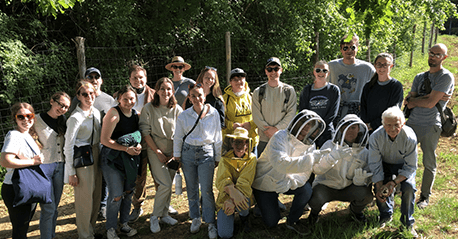
The Monasterino is an example of a new way of thinking about philanthropic engagement, sparked by an independent school art teacher. Ken Tighe, chair of the visual arts department at Walnut Hill School for the Arts, leaned on a centuries-old idea of apprenticeship and retreat as a way to grow and expand our minds:
“The combination of art making and the travel experience can be transformative for the young artist! Not only does it give them permission to conjure more freely but, maybe for the first time, see themselves beyond the constraints of their usual surroundings and interactions, and understand their relationship to the world in wonderful new ways. The Monasterino was thoughtfully and intentionally designed, with the young artist in mind, to be the jumping off point for unique creative exploration and wondrous self discovery.”
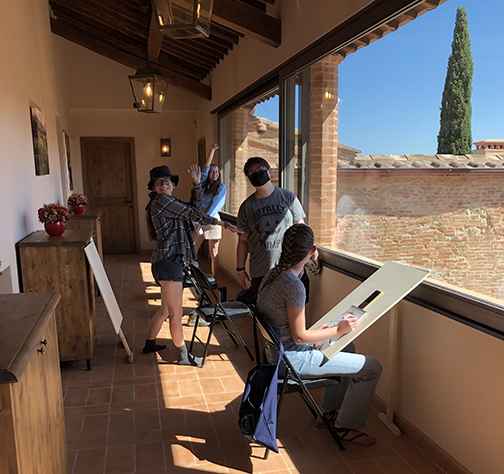
One visionary phone call with a donor family set the wheels in motion and the retreat has been operational since 2021. Having visited the monastery while it was still being restored, I had no doubts about the magnificence of the place and the hospitality it would provide. This little gem of an estate can host 16 students and their accompanying teachers. It is pitched high on a hill, surrounded by hundreds of fruit trees, a vegetable garden, and bee hives with its keeper. What will knock you off your feet is the mission it aims to fulfill:
Monasterino della Conoscenza’s mission is to promote accessible education by hosting students from independent schools and universities for—free.
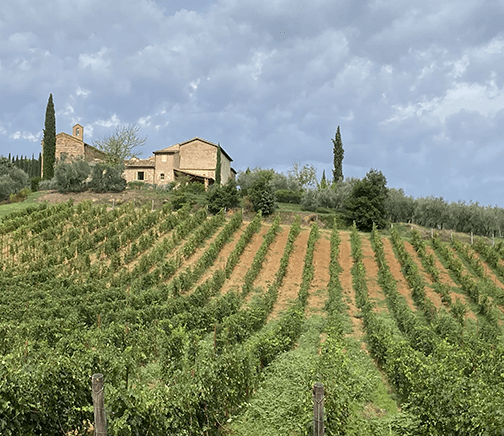
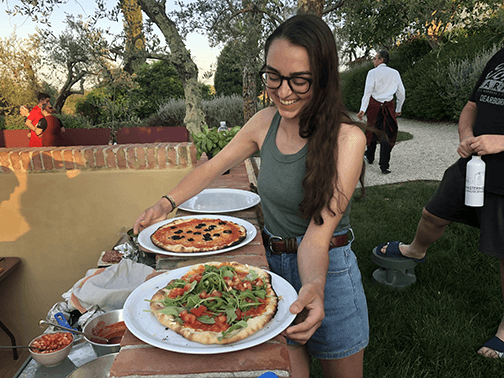
Schools wanting to visit need to propose a project. Groups that have visited the Monasterino, immerse themselves in the study of the humanities, sciences, and art-making (painting, writing, music) in the professionally equipped multi-use studio spaces. The chapel serves both as a cafeteria and conference room, outfitted with large screens, projectors, and of course, fast WI-FI. A private chef cooks all meals. In Tuscany, the culinary arts are unparalleled in flavor and scope. Students especially love pizza night, which they cook themselves on the outdoor wood-burning stove and then vote on the best flavored one. And then there is the beautiful pool.
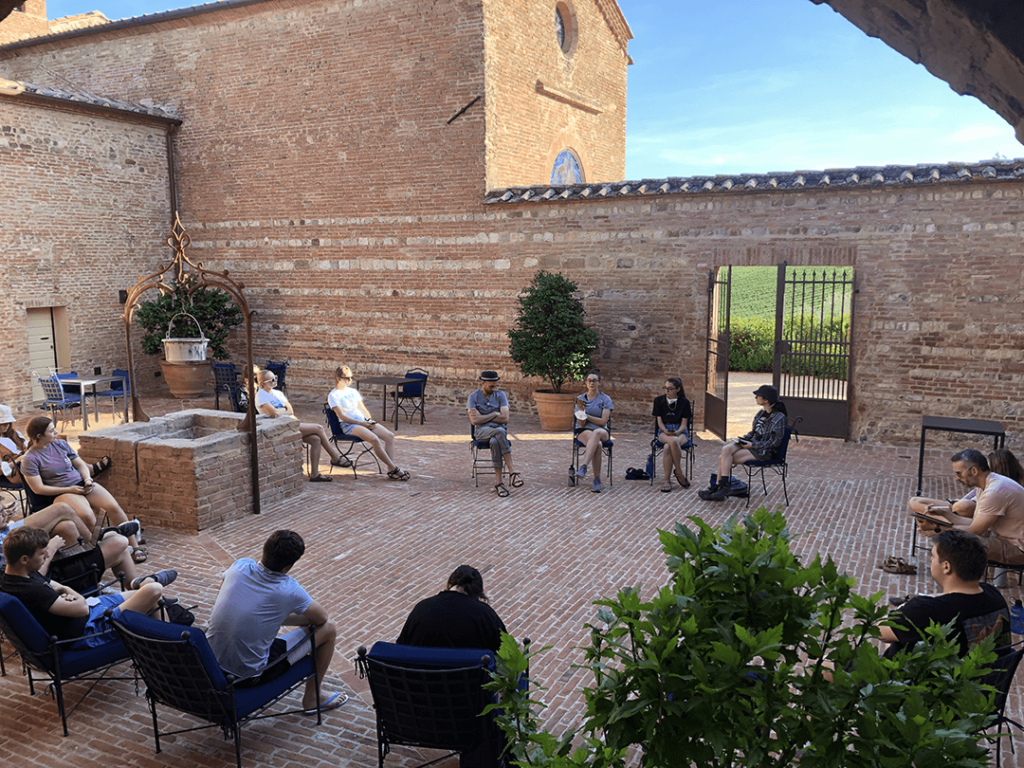
Living in a monastery is in essence about slowing down, conversations on the beautiful patio, and taking in the panorama of the rolling hills. Knowledge is nourished through immersion in a beautiful place, heightened awareness, and cultivating an interest at your own pace.
The impact on the young minds is tangible, as one of the teachers remarked:
“ I hope you saw how much of an impression—a life changing impression, you made on the lives of all these students. The staff were all so friendly, kind, and patient, making efforts in English and tolerating our feeble attempts in Italian. The hills of Tuscany may be the closest thing to heaven on earth and the Monastery is a gem.”
As an administrator that organized many trips to foreign countries, the mission of the monastery provided an opening, a chance to make a fantastic experience accessible to all that showed desire and new ideas.
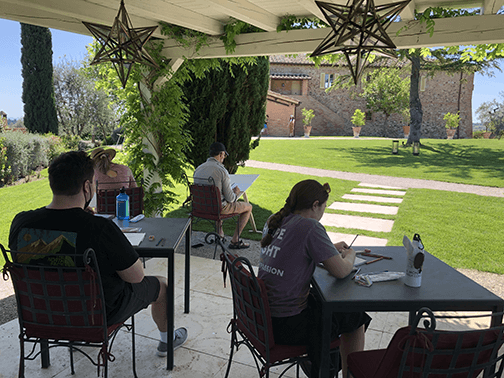
What a relief.
I could walk into planning and fundraising meetings with 80% of expenses already covered: the Monasterino was investing in our students’ future, sight unseen and no questions asked. Who could then, in good conscience, refuse the idea of a trip that would have been labeled divisive and privileged when we had a home to go to, a pillow to rest our heads on, and to die for Italian food to eat? The only thing that groups have to commit is one community activity during their stay. This can take the form of volunteering at the local soup kitchen, helping in clothing and grocery distribution, cleaning up a neighborhood park, or helping with the planting of new plants with the local urban garden non-profit.
Some work at home still needed to be done, as the flights, pocket money, and excursions to Florence and Rome had to be paid for. At Walnut Hill, we were able to defray the additional costs through extra fundraising and learned how a great opportunity inspires people to give! From air miles to points to plain old cash, the trip came together seamlessly. The budget accounted for multiple full scholarships based on the merit of the project proposal, decided upon in collaboration with Chiara. The final cost for the paying students was a fraction of the real budget. We felt great about the opportunity, the exposure, and the potential of this partnership. Studio Toscano at Walnut Hill was ultimately canceled due to the lockdown, but the idea now exists and will no doubt flourish in the future.
It would be nice to bring travel back to the conversation. Trips used to be a curricular staple and element of pride in independent schools that differentiated us. My early experiences as a young teacher were full of opportunities to pack my bags and leave! Sadly it had declined even in pre-pandemic times. Teachers are so ridden with additional responsibilities and the expectation is to offer trips during school vacation. For anyone who has chaperoned a trip with students, calling it a vacation is a joke. Teaching on the road is a skill that should be fostered and supported for what it is: wonderful work.
Fundraising for travel may seem less important than expanding the curriculum. DEJI activities are mostly relegated to clubs, affinity groups, and swag. In my mind, a trip of any length or destination, from camping in a park around the corner to flying to far places, does more for community building than anything else.
Why? Because we move out of our comfort zone, because we sleep in a room with other people, because we cook together and try different foods, because we fall in love with the sounds of a new language, because at night, instead of holding a device we will go out and look at the stars. When we are away, our hearts open, curiosity blossoms, and the cliché holds true: we are forever changed. Chiara echoes this sentiment:
“One of the most impressive experiences has been to notice how a group of strangers in one or two weeks become a family, with profound bonds and rediscover the pleasure of talking, exchanging opinions, or just gazing at the horizon, thinking, with no stress and experiencing everything with open hearts.”
Visionary philanthropy such as the Monasterino project created a place that aims to nourish the body and soul of young people. Travel is the magic mushroom of education, the stuff teachers and students live for.
Ready to plant a seed about travel in your school? If you are interested in the Monasterino della Conoscenza, you can send Chiara an interest form here.
You may also be interested in reading more articles written by Nicola Conraths for Intrepid Ed News.

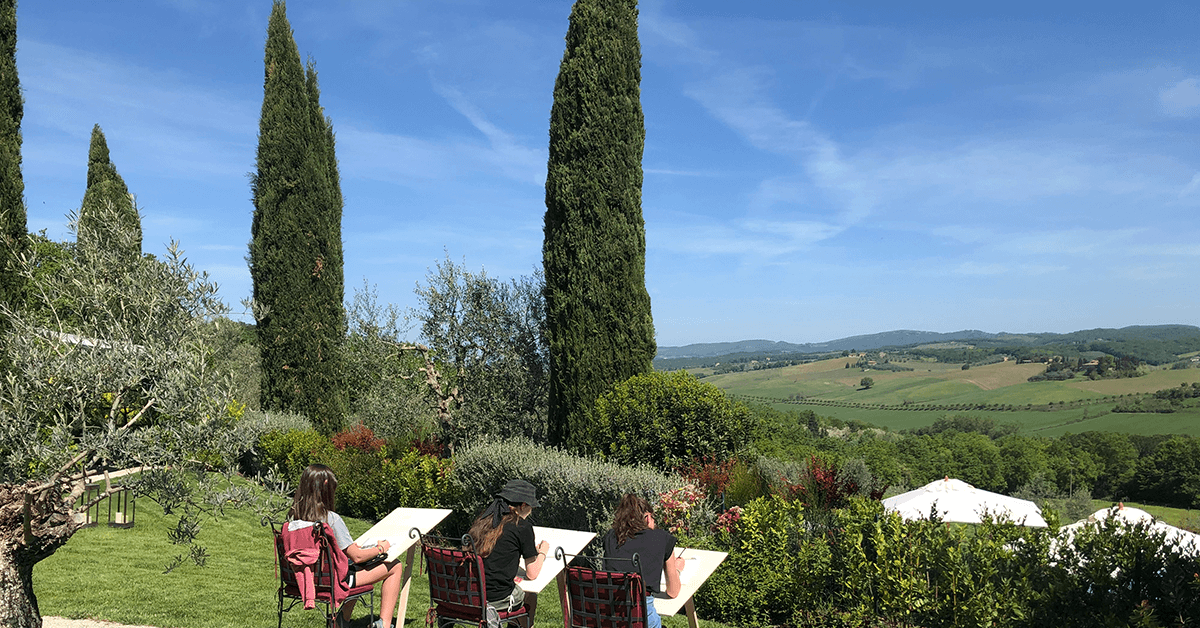
Great article, Niki!